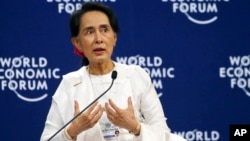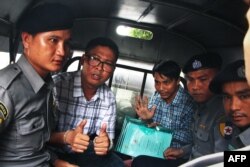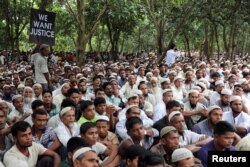Myanmar de facto leader Aung San Suu Kyi has defended her country against criticism of last week's conviction of two Reuters journalists on charges of violating the country's colonial-era Official Secrets Act.
Wa Lone and Kyaw Soe Oo were arrested last December after meeting with two police officers at a restaurant in Yangon and being given a stack of documents. They were investigating the massacre of 10 Rohingya Muslims by police and soldiers in the village of Inn Din last year.
The two journalists were sentenced to seven years in prison.
Speaking at the World Economic Forum in the Vietnamese capital, Hanoi, Aung San Suu Kyi urged anyone who has criticized the verdict and called for the journalists' release, including U.S. Vice President Mike Pence, to "point out" if there has been a miscarriage of justice.
The lawyer for the journalists, Khin Maung Zaw, said, “I simply do not want to criticize to attack our leader. I recalled Daw Aung San Suu Kyi’s remark when Unity Journal reporters were convicted in 2015 on the same Official Secrets Act charges.
"Now she made this opposite remark of what she has said in 2015, which was independent without any string attached. It was before she … led the country. I would like to embrace that moment of her being independent.”
He was referring to convictions related to the Nov. 25, 2014, publication of a Unity Journal article about a military facility that had been built in Pauk township on land confiscated from local farmers. The article included photographs of the facility and alleged that it was a chemical weapons factory, according to Human Rights Watch.
The government denied the report and charged four journalists and the chief executive officer of Unity Journal with violating the Official Secrets Act. All five were convicted and sentenced to 10 years in prison. On appeal, their sentences were reduced to seven years.
Amnesty International criticized Aung San Suu Kyi's defense of the journalists' conviction.
“This is a disgraceful attempt by Aung San Suu Kyi to defend the indefensible. To say that this case had ‘nothing to do with freedom of expression’ and that Wa Lone and Kyaw Soe Oo ‘were not jailed for being journalists’ is a deluded misrepresentation of the facts," said Minar Pimple, Amnesty International’s senior director of global operations. "From start to finish, the case was nothing more than a brazen attack on freedom of expression and independent journalism in Myanmar."
During her remarks in Hanoi, Aung San Suu Kyi also said her government could have handled the situation with the Rohingya Muslims differently.
Aung San Suu Kyi's reputation as an icon of democracy and human rights, earned during her years of detention by Myanmar's former military regime, has been damaged by her failure to speak out against the brutal military campaign in Rakhine state that has driven nearly 700,000 Rohingya Muslims across the border into Bangladesh since last August.
The United Nations and United States have collected numerous eyewitness accounts of atrocities committed by government forces, including gang rapes, the torching of entire villages and extrajudicial killings.
The U.N. has called the military campaign a "textbook example" of ethnic cleansing and has called for General Min Aung Hlaing, the commander-in-chief of Myanmar's army, and five other generals to be tried for genocide, crimes against humanity and war crimes.
In a tweet Thursday, U.S. Ambassador to the U.N. Nikki Haley, criticized Aung San Suu Kyi’s comment:
Aung San Suu Kyi told the audience in Hanoi that "with hindsight I think the situation could have been handled better," but said authorities cannot "choose and pick" who would be covered by the rule of law.

















